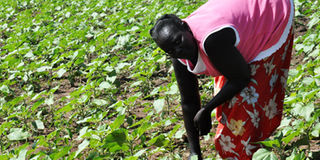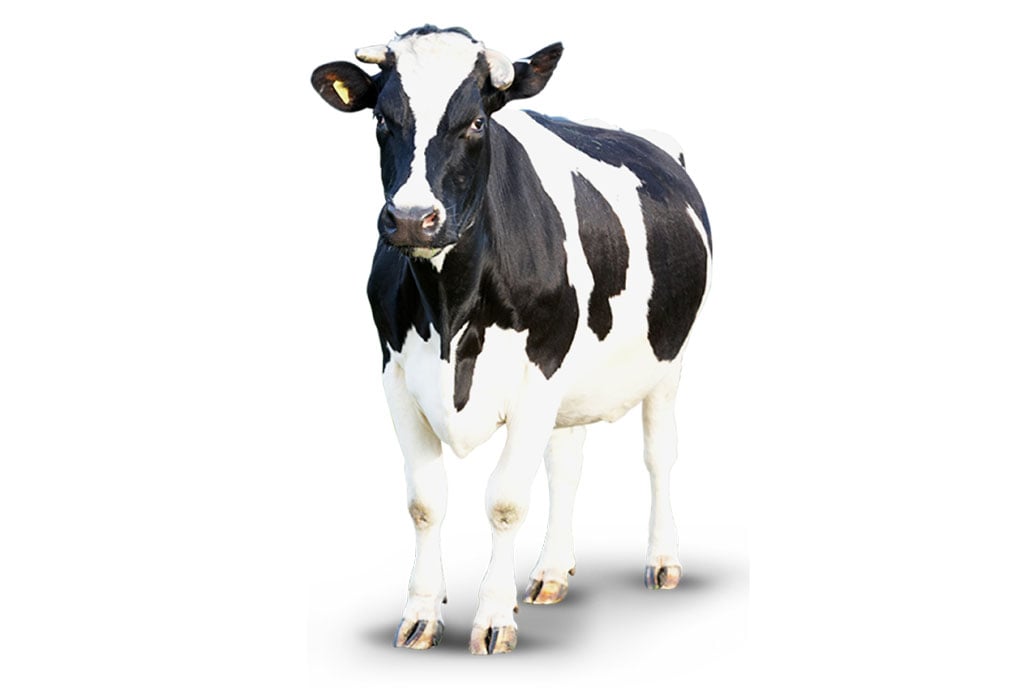Dokolo farmer earning from sunflower, simsim

Eton tending to her garden where she grows a variety of crops alongside sunflower and simsim. PHOTOS BY EDGAR R. BATTE
Life is a continuous learning process and age is just a number. This one lesson Jamila Eton learned from farming as Edgar R. Batte found out.
My name is Jamila Eton, I used to be Margaret Achieng, which is my maiden name. I am a housewife and a farmer. I farm on four acres of land and employ up to 10 workers. One of the outstanding things about farming is seeing something blossom in the garden.
I grow sunflower and simsim, and depending on the season, I also plant sorghum, pigeon peas, cassava, potatoes and beans. I am also trying out bananas.
Since most of them are seasonal, I was thinking of growing perennial crops like bananas and passion fruits. In addition to crops, there is beekeeping, which I have just started. So far I make some money off sunflower. From one acre of sunflower, I make a net profit of Shs600,000 per season after expenses are deducted, this is from gross earnings of Shs1m.
Motivating
What I like about sunflower is that it is not hard to grow. Through CPAR Uganda, a local NGO, we were taught good farming methods. They showed us to grow it in rows, with one seed per hole. With good rains, we weed after one month. Then three weeks after that. Sunflower will be ready for harvest within three months. Simsim is good too as a cash crop and for health reasons. We plant it twice in a year. However, the second season does is not as commercially rewarding as the first season due to the weather changes.
In a season, I plant 15 kilogrammes on three acres. This costs me Shs48,000. The last season was a successful one. I earned Shs1.2m.
In addition to farming methods, CPAR has taught us to work together as a group and cut out the middlemen.
I like working in groups because it is motivating and gives one the morale to work harder. One also get to knows other people, so he or she is not confined to himself or herself.
When I started working as a beneficiary of Cpar in 2010, we were growing rice as a group of old widows. We were 30 when we started. Along the way four members passed away and they were replaced. We grew rice on two acres of land and harvested one bag of rice. A kilogramme of rice is at Shs3,000. This was a loss. We tried individually and it still did not work. Then we gave up on upland rice. So we started on other things.
One of these was vegetables, groundnuts and simisim. The highest I have attained from simsim is Shs2m in a season, which encouraged me a lot. From groundnuts I have earned Shs500,000. I never used to earn as much from my efforts. In the capacity building training, I was taught that life is an ongoing process and everything you do is a process.
Being innovative
I have also learnt that I should always be doing something and should not sit back. I was taught to do anything small like selling onions or plant vegetables in a small place but never sit back. Initially my husband was providing everything but now, I cannot depend entirely on him. That is how I have started thinking out of the box, to try crops I have not been growing like matooke.
I would just advise women never to depend on men financially. If your husband can provide for you, well and good, but always be innovative to help your husband so that everything you do is a concerted effort as a couple.
I have eight children. The oldest is 42 years old. She is an assistant registrar in Busitema University and the youngest is working with an NGO called Hope for Humans. Even then I do not want to depend on my children because they need to cater for their families. I have my own plans.
In the next few years, I see myself having my banana plantations and selling them at a good price.
I plan to expand my beekeeping enterprise, with more hives. I will also have passion fruits, which I am going to expand too.
May be I will not be strong enough to do commercial farming like I am currently doing but I be growing vegetables for both home and commercial purposes. I am currently investing my money in buying cows. Perhaps in 10 years, I will be selling them for beef. The last cow we bought was at Shs400,000.
May be the price will go up which will put me in a good position to sell at a profit.
Traditionally, we the Langi, are cattle keepers. And it is one way of keeping money. When you need the money, you just get the cow and go sell it. That is why we like keeping the cows and we also get free milk.
We are currently building two houses on our own so that our children are proud that we can do something without depending on them.
What others say about beneficiary and cpar’s work
About his wife, Rashid Eton, Local Council Chairman, Dokolo District, says:
My wife is everything to me. She is also like a mother to me. She has helped me and has given me children.
She is very innovative and has gone to school more than me. I went up to Senior Four and she stopped in Senior Five from Mt St. Mary’s Namagunga.
She left school to join the East African railways.
John Baptist Okello-Okello, Chairman, Dokolo District, who is also board member, CPAR:
CPAR Uganda has been working with farmers in Dokolo District for some time. They started out by helping train farmers in good farming practices like inter-cropping to maintain soil fertility in partnership with European Union under the Northern Uganda Action Plan.
They have done a lot in raising the capacities of farmers as well as nutrition and income through promotion of working in groups and saving amongst themselves.
They have given them shelling machines for maize as one of the post-harvest facilitations that add value to their crops before they finally sell them in the markets.




